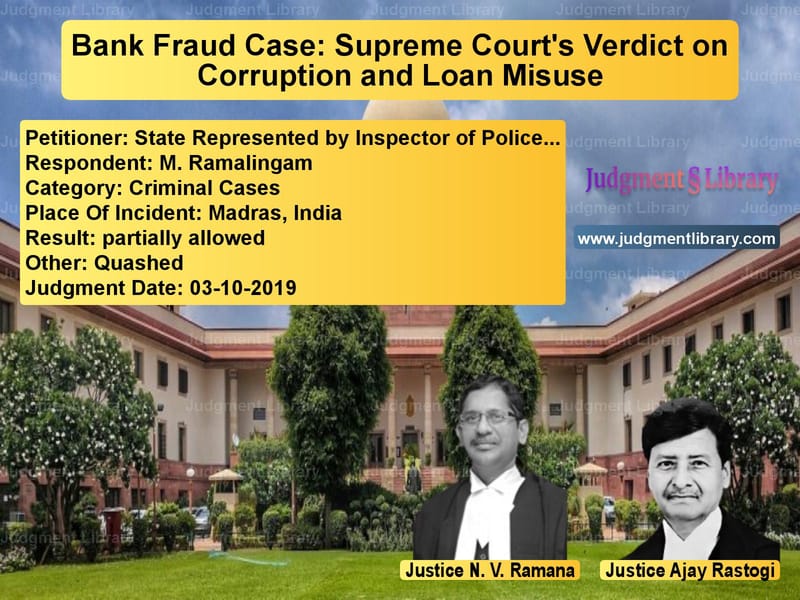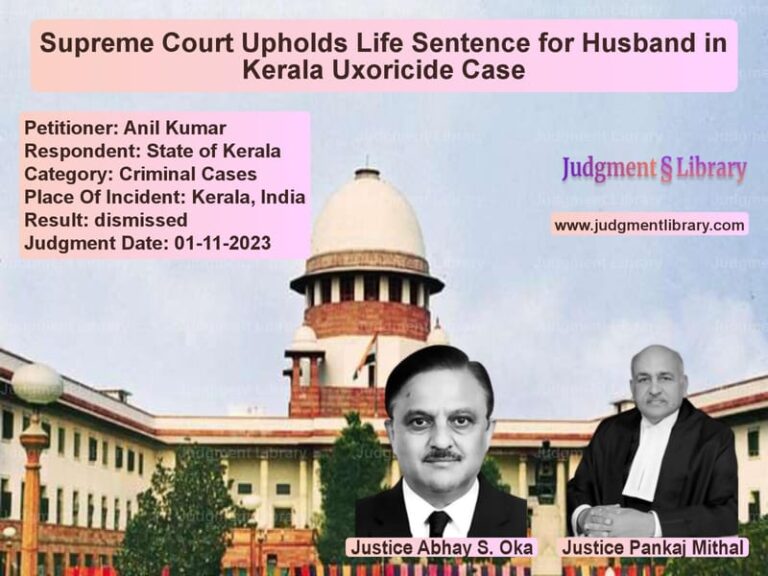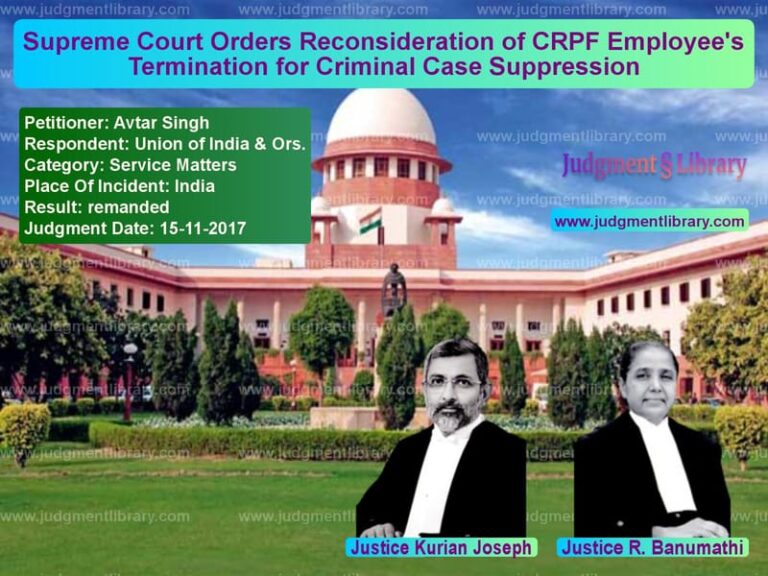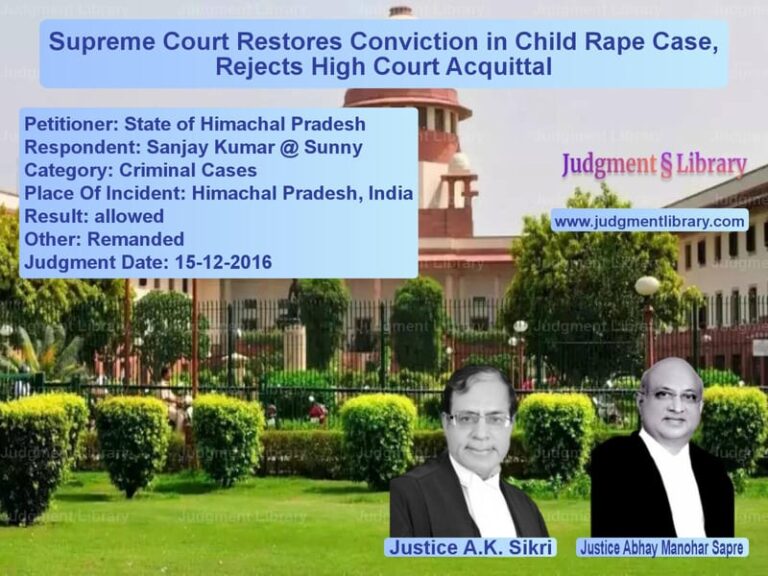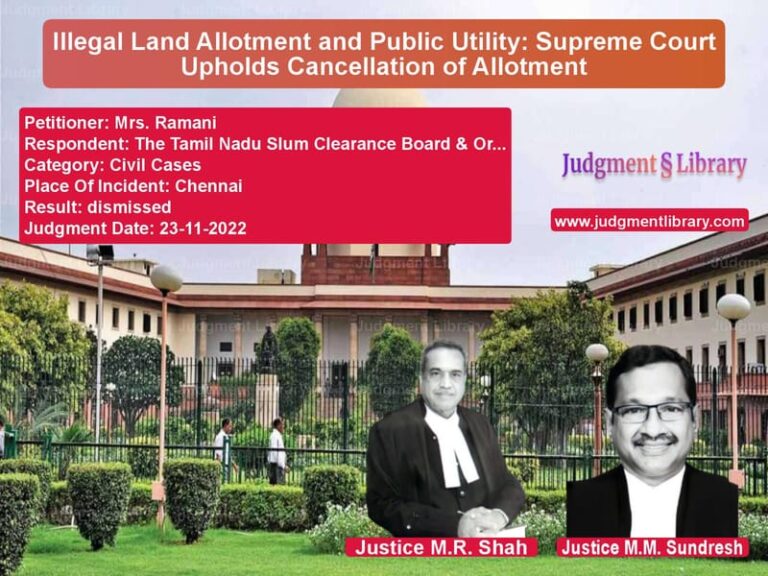Bank Fraud Case: Supreme Court’s Verdict on Corruption and Loan Misuse
The case of M. Ramalingam vs. State Represented by Inspector of Police, SBE/CBI/ACB, Madras involved a significant legal battle concerning corruption, loan fraud, and the misappropriation of bank funds. This case revolved around fraudulent jewel loan transactions at the Indian Overseas Bank (IOB) branch in Narikudi, leading to the conviction of bank officials for conspiracy, forgery, and misuse of power.
The case was heard by the Supreme Court after appeals were filed against the judgment of the Madras High Court, which upheld the conviction of bank officials under various sections of the Indian Penal Code (IPC) and the Prevention of Corruption Act, 1988. The Supreme Court’s ruling provided clarity on the liability of bank employees in cases of financial fraud.
Background of the Case
The case stemmed from fraudulent loan sanctions by T. Maran, the branch manager of IOB, and his associates. The bank’s vigilance team detected irregularities in the issuance of agricultural jewel loans, leading to an internal investigation that unearthed multiple instances of fraud.
Three separate criminal cases were registered against T. Maran and his co-accused, including M. Ramalingam and N. Rajangam, under the following charges:
- Forgery (Sections 467 and 471 IPC)
- Cheating (Section 420 IPC)
- Criminal Conspiracy (Section 120B IPC)
- Misuse of official position (Section 13(2) read with Section 13(1)(d) of the Prevention of Corruption Act, 1988)
Petitioner’s Arguments
The prosecution, representing the State, argued that the accused individuals conspired to defraud the bank by sanctioning loans without proper security. The key arguments presented were:
- Jewel loans were granted without actual pledging of gold.
- Loan entries were manipulated in bank records to show fictitious transactions.
- Bank officials misused their positions for personal financial gain.
- The fraudulent activities caused significant financial losses to the bank.
Respondent’s Arguments
The accused individuals, including T. Maran and M. Ramalingam, defended themselves by arguing:
- They were not solely responsible for the loan processing and had acted within their professional duties.
- There was no direct evidence proving their personal involvement in the fraud.
- The discrepancies in loan documentation could have been due to clerical errors rather than deliberate fraud.
- The prosecution had failed to establish the case beyond a reasonable doubt.
Supreme Court’s Key Observations
The Supreme Court, while delivering its judgment, made the following crucial observations:
“The evidence presented establishes beyond a reasonable doubt that the accused, particularly T. Maran, misused his official position to approve loans without proper security, thereby committing offenses under the Prevention of Corruption Act.”
Further, the Court noted:
“In financial transactions involving public funds, the highest degree of integrity is expected from bank officials. Any deviation leading to personal or third-party benefits amounts to a breach of public trust.”
Final Verdict
Based on the evidence and arguments presented, the Supreme Court ruled:
- The conviction of T. Maran under Sections 467, 471, 420 IPC, and Section 13(2) read with 13(1)(d) of the Prevention of Corruption Act was upheld.
- The conviction of M. Ramalingam and N. Rajangam under conspiracy and forgery charges was set aside due to lack of conclusive evidence.
- T. Maran was ordered to serve his remaining sentence.
- M. Ramalingam and N. Rajangam were acquitted.
Legal and Financial Implications
The ruling reinforced the importance of ethical banking practices and highlighted the consequences of financial mismanagement. The case serves as a precedent for:
- Ensuring strict regulatory compliance in banking operations.
- Holding bank officials accountable for fraudulent activities.
- Strengthening internal auditing mechanisms to detect and prevent financial fraud.
Conclusion
The Supreme Court’s judgment in this case underscores the need for transparency and integrity in banking transactions. While the primary accused was convicted, the acquittal of the co-accused highlights the necessity of irrefutable evidence in criminal trials. This ruling serves as a crucial reference point for financial fraud cases, ensuring that public trust in banking institutions is upheld.
Petitioner Name: State Represented by Inspector of Police, SBE/CBI/ACB, Madras.Respondent Name: M. Ramalingam.Judgment By: Justice N. V. Ramana, Justice Ajay Rastogi.Place Of Incident: Madras, India.Judgment Date: 03-10-2019.
Don’t miss out on the full details! Download the complete judgment in PDF format below and gain valuable insights instantly!
Download Judgment: State Represented by vs M. Ramalingam Supreme Court of India Judgment Dated 03-10-2019.pdf
Direct Downlaod Judgment: Direct downlaod this Judgment
See all petitions in Fraud and Forgery
See all petitions in Money Laundering Cases
See all petitions in Extortion and Blackmail
See all petitions in Judgment by N.V. Ramana
See all petitions in Judgment by Ajay Rastogi
See all petitions in partially allowed
See all petitions in Quashed
See all petitions in supreme court of India judgments October 2019
See all petitions in 2019 judgments
See all posts in Criminal Cases Category
See all allowed petitions in Criminal Cases Category
See all Dismissed petitions in Criminal Cases Category
See all partially allowed petitions in Criminal Cases Category

